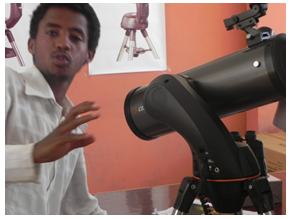
(Credit: OLPC)
Earlier this year, OLPC workers dropped off closed boxes containing the tablets, taped shut, with no instruction. “I thought the kids would play with the boxes. Within four minutes, one kid not only opened the box, found the on-off switch … powered it up. Within five days, they were using 47 apps per child, per day.
Within two weeks, they were singing ABC songs in the village, and within five months, they had hacked Android,” Negroponte said. “Some idiot in our organization or in the Media Lab had disabled the camera, and they figured out the camera, and had hacked Android.” ….
With 100 million first-grade-aged children worldwide having no access to schooling, the One Laptop Per Child organization is trying something new in two remote Ethiopian villages — simply dropping off tablet computers with preloaded programs and seeing what happens.
The goal: to see if illiterate kids with no previous exposure to written words can learn how to read all by themselves, by experimenting with the tablet and its preloaded alphabet-training games, e-books, movies, cartoons, paintings, and other programs.
The experiment is being done in two isolated rural villages with about 20 first-grade-aged children each, about 50 miles from Addis Ababa. One village is called Wonchi, on the rim of a volcanic crater at 11,000 feet; the other is called Wolonchete, in the Rift Valley. Children there had never previously seen printed materials, road signs, or even packaging that had words on them, Negroponte said.
READ MORE: MIT Technology Review
AI and Ethiopia: an unexpected synergy
Excerpts written Oct 25, 2012 by Ben Goertzel
In February of this year, KurzweilAI.net’s Amara Angelica ..was in touch with an enterprising young Ethiopian engineer named Getnet Aseffa, who was interested in advanced technologies and their implications, and especially in their potential application to help Ethiopia and other African nations.
Like Kenya, the majority of Ethiopians are still rural farmers, and poverty, unemployment and income inequality are all high. ……There is a highly energetic and rapidly increasing population of businesspeople, entrepreneurs and technologists, explicitly striving to better their country and maintain its fantastic growth rate by starting and executing a huge variety of projects.
AI in Africa?
… Many decision-makers in Ethiopia and other developing countries recognize the existence of opportunities to leapfrog past stages of development that currently developed countries have passed through, using new technologies to hop directly into the future.
… there are great opportunities for AI to help developing countries … and for these countries to help advance AI.
How AI might help
- .. previous work using the OpenCog AI system to predict power transformer failures. This sort of application is extremely interesting .. given their rapidly growing and sometimes rickety power grid.
- AI-controlled microdrones … are already in use for surveillance purposes, but supplying them with better machine vision could allow them to be used more broadly, e.g., to survey crops and track the spread of agricultural disease. Similar technology could enable microdrones to be used to help with mining prospecting.
- AI-powered bioinformatics…could be used to help understand Africa-specific health problems, and help accelerate genetic engineering of crops
- AI dialogue systems, accessible via cellphone, could be used to provide medical & other decision support
- AI tutors, provided via smartphone, could enhance the education system. The reason why 30% or more primary school graduates don’t attend high school is mainly transportation. … Tele-education may be part of the solution.
- Smartphone-based medical diagnostics. With a microscope attachment, a smartphone can analyze blood samples and message the pictures to servers where AIs or human doctors can analyze them. A host of other portable, automated diagnostic possibilities exist — this is related to the current Tricorder X-Prize.
What seems to be lacking at the moment is any organization oriented toward carrying out these sorts of applications. Perhaps in time, … Universities will formalize an organization similar to MIT Media Lab, bringing together scientists and engineers with various backgrounds to creatively address .. issues and opportunities using AI and other advanced technologies.
…..The Ethiopian infrastructure is still at an early stage of development, [SIMILAR TO kENYA] but for some industries, this doesn’t matter that much. Software is a good example. The average Internet bandwidth in Ethiopia is distressingly low, but for a relatively modest price one can get a decent connection (say, hundreds of U.S. dollars per month). And the bandwidth situation is rapidly improving. Computer hardware and repair are readily available.
Of all the advanced technologies pushing directly toward Singularity, AI distinguishes itself by requiring the least resources. Nanotech, robotics and biotech require expensive lab equipment, which is difficult to maintain appropriately in a location like Ethiopia, where spare parts are far away. But AI just requires computers and smart programmers, and an Internet connection … [KENYA] has all of those, and at a remarkably low price. So it seems quite possible that …. developing countries, could end up serving as the engines of AI advancement — maybe even the location of the breakthrough from narrow AI to Artificial General Intelligence.
Many thanks to Ben Goertzel and @KurzweilAI for the forward.
